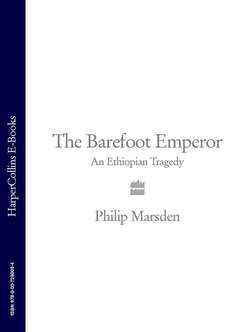Читать книгу The Barefoot Emperor: An Ethiopian Tragedy - Philip Marsden - Страница 21
Оглавление9
Standing barefoot on the stony earth, with his plain shamma around his shoulder, Tewodros would say: ‘Without Christ, I am nothing.’ He understood his worldly role in terms of biblical precedent. He understood his particular duty as saving Ethiopia’s Christians from extinction by Muslims. He would first convert the Oromo to Christianity, then put the choice to all remaining Muslims in his realm: follow Christ or leave the country. He was not above superstition, seeing portents when they were obviously put in his way. But his zealotry was Christian. He was a crusader, the heir of David, the Elect of God, the dutiful Slave of Christ.
Yet Tewodros didn’t much care for priests. During the Zemene Mesafint many of Ethiopia’s clergy had, according to the chronicles, become ‘polygamists, sorcerers and drunkards’; by day they performed the rites, by night they visited women without husbands. Even worse, they had confused and divided the people with their arguments, squandering the comforts of orthodoxy for baffling schisms. As in the Mesafint of old, when the children of Israel forgot Jahweh and went a-whoring after Baal and all the false gods, so the priesthood had forgotten the one truth.
Foreigners were to blame, at least in part. The Portuguese in the sixteenth century had brought their own interpretation of Christ’s nature and convinced many Ethiopians to adopt it. These ones became known first as Kidat – ‘Unctionists’– then as Yesaga Lij – ‘Son by Grace’– and finally as Sost Lidet or ‘Three Births’, because they said that Christ was anointed in a ‘third birth’. To their detractors the Three-Birthers had therefore to admit the inadmissible: that there was a time when Christ was not fully divine. For traditionalists of the Alexandrian, non-Chalcedonian persuasion, that was a heretical slur on the pure divinity of Christ. These ones referred to the Three-Birthers as Karra Haymanot – Faith-in-the-Knife – because they had sliced the third birth from their teaching.
Tewodros was not interested. He wanted conformity. If the Church was to help in re-unifying the country, it must be unified itself. In 1854, in his first act of statesmanship, he called a council of clergy in Gondar. He was not yet emperor, but having defeated Dejazmach Wube, he now stood with an important ally at his side – Abune Selama.
The abun was the head of the Ethiopian Church, the only bishop in the entire country. The post was never held by an Ethiopian, but always an Egyptian, a Copt appointed by the Patriarchate in Alexandria. Often the incumbent was elderly, unable to speak Amharic, and ignored. In the 1820s, writing about Selama’s predecessor, Dejazmach Sebadagis complained to the Alexandrian patriarch: ‘Was it because you hate Ethiopia that you sent him?’ And as Egypt expanded south under Muhammad Ali, and spread the terror of invasion in Ethiopia, so suspicions of the Coptic abun grew.
Arriving in Ethiopia in 1841, the new Abune Selama was young and ambitious. He was appalled at the spread of Catholic missionaries in northern Ethiopia, and was keen to protect the traditional conformity with Alexandria. In the rise of Tewodros he found someone of like mind, and as vigorous and as determined as himself. At the meeting of clergy in 1854, he and Tewodros outlawed the Three-Birthers, demanding a choice between confession of the Alexandrian creed, or death. They also ordered the expulsion of Catholic missionaries. Shortly afterwards Abune Selama crowned Tewodros and sanctified in church his marriage to Tewabach. Their alliance found its most powerful expression in the invasion of Shoa some months later, when they arrived together at the head of an army.
The fertile alliance between the two men did not last. Abune Selama was too ambitious, too strong-willed, too much like Tewodros himself, for it to be an easy relationship. Antagonisms between them began to multiply. The clergy too began to grumble about the speed of Tewodros’s reforms. After the rains of 1856 he called another gathering of clergy in Gondar, to persuade them of the need to tax some of their vast wealth.
‘Our enemies are many,’ Tewodros told them. ‘It is only fair that some of this should go to feed those who protect us all.’
The clergy also needed to eat, he was told. And anyway, there were more of them than of his soldiers. ‘What you should do,’ said one priest, ‘is take your army from one province to the next, allowing each one to recover its reserves of grain.’
‘That’s how it’s always been, Your Majesty,’ explained another. ‘It’s the custom.’
Neither side conceded anything. In the end the priests fetched the Fetha Negest, the ‘Book of the Law of Kings’, and read: ‘That which is taken to the Holy of Holies should not be taken out.’ From which was understood, it was not in anyone’s power to relinquish Church land.
‘This book,’ fumed the emperor, ‘has been translated a thousand times and interpreted in a thousand ways! If you want to put another on the throne, do so. And like the Oromo rulers I will continue to plunder the beasts and the fields of the people!’
He turned and left, and the priests watched his guards close around his back.
As quick as Tewodros’s anger was his remorse. Later he called Abune Selama to him, and the two men agreed a compromise. The priesthood would accept Tewodros’s right to tax them, and Tewodros would agree not to exercise the right.
And the next day the priests led a joyful procession through the streets of Gondar. The city was filled with the sound of the kebbero and the debteras’ sistra and the songs of Moses. Tewodros had failed. The expansion of his rule had, for now, reached its limit at the gates of the church. He returned to campaigning.
